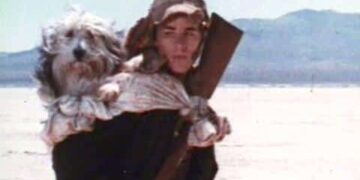Throughout his life, Ellison was a vocal critic of the film industry, a lover of literature and the arts, and a fascinating figure in his own right. In this article, we’ll explore the life and work of Harlan Ellison, from his earliest days as a writer to his lasting impact on literature and film.
Harlan Ellison’s Life and Career
Harlan Ellison was born in Cleveland, Ohio, in 1934. He grew up in a poor family, but his parents instilled in him a love of reading and writing from an early age. As a teenager, he began selling his stories to science fiction magazines, and by the 1960s he had become one of the most respected writers in the field.
Ellison was known for his uncompromising attitude and his willingness to speak out against injustice. He was never afraid to challenge authority, and his work often dealt with themes of social inequality and political corruption. His novels, short stories, and screenplays were filled with characters who were flawed, complex, and fiercely independent.
The First Book: “Memos from Purgatory”
Ellison’s first book, “Memos from Purgatory,” was published in 1961. It was a semi-autobiographical account of his experiences working undercover in a gang in New York City. The book was a critical success, and it established Ellison as a major talent in the literary world.
“Memos from Purgatory” was followed by a string of successful novels and short story collections, including “The Beast that Shouted Love at the Heart of the World,” “Deathbird Stories,” and “I Have No Mouth, and I Must Scream.” Ellison was also a prolific screenwriter, and he worked on a number of television shows and movies throughout his career.
The Last Book: “Can & Can’tankerous”
Ellison’s final book, “Can & Can’tankerous,” was published in 2018, just a few months before his death. The book was a collection of essays, rants, and musings on a variety of topics, from politics to pop culture. It was a fitting tribute to Ellison’s distinctive voice and his lifelong commitment to speaking truth to power.
Harlan Ellison’s Best Quotes
Ellison was known for his sharp wit and his ability to turn a phrase. He was a master of the one-liner, and many of his quotes have become famous in their own right. Here are just a few of his best:
- “The two most common elements in the universe are hydrogen and stupidity.”
- “You are not entitled to your opinion. You are entitled to your informed opinion. No one is entitled to be ignorant.”
- “I have no mouth, and I must scream.”
- “The trick is not becoming a writer. The trick is staying a writer.”
- “The two most important days in your life are the day you are born and the day you find out why.”
Harlan Ellison’s Best Books
Ellison was a prolific writer, and he produced a number of classic works over the course of his career. Here are a few of his best:
- “The Glass Teat” – a collection of essays on television and pop culture.
- “Dangerous Visions” – an influential science fiction anthology edited by Ellison.
- “A Boy and His Dog” – a post-apocalyptic novella that was later adapted into a movie.
- “The City on the Edge of Forever” – a classic episode of “Star Trek” that Ellison wrote.
- “Strange Wine” – a collection of short stories that showcases Ellison’s range and versatility as a writer.
Books in Order: A Guide to Reading Harlan Ellison’s Works
If you’re interested in exploring Ellison’s work, it can be helpful to read his books in order. Here’s a guide to his major works, arranged chronologically:
- “Memos from Purgatory” (1961)
- “The Deadly Streets” (1958)
- “Web of the City” (1958)
- “Ellison Wonderland” (1962)
- “Paingod and Other Delusions” (1965)
- “I Have No Mouth, and I Must Scream” (1967)
- “The Beast that Shouted Love at the Heart of the World” (1969)
- “A Boy and His Dog” (1969)
- “The Harlan Ellison Hornbook” (1970)
- “The Glass Teat” (1970)
- “Approaching Oblivion” (1974)
- “Deathbird Stories” (1975)
- “Strange Wine” (1978)
- “Shatterday” (1980)
- “Stalking the Nightmare” (1982)
- “Angry Candy” (1988)
- “Slippage” (1997)
- “The Essential Ellison” (2000)
- “Can & Can’tankerous” (2018)
Harlan Ellison’s Criticism of the Film Industry
Ellison was a passionate critic of the film industry, and he was never shy about expressing his opinions. He was particularly critical of Hollywood’s tendency to water down and simplify complex stories, and he often clashed with studio executives over creative control.
One of Ellison’s most famous battles was with James Cameron over the movie “The Terminator.” Ellison claimed that Cameron had stolen the idea for the movie from his own work, and he sued Cameron for plagiarism. The case was eventually settled out of court, and Ellison was credited as a writer on the film.
Harlan Ellison’s Love Life and Friendships
Ellison was a complex figure in his personal life as well. He was married five times and had a number of romantic relationships throughout his life. He was also known for his close friendships with other writers, including Isaac Asimov, Ray Bradbury, and Philip K. Dick.
Harlan Ellison’s Life Outside of Writing
Despite his reputation as a prolific and dedicated writer, Ellison had a life outside of his work as well. He was an avid collector of comic books and science fiction memorabilia, and he was a frequent guest at conventions and fan events.
Ellison was also a passionate advocate for civil rights and social justice. He was involved in a number of political causes throughout his life, and he used his platform as a writer to draw attention to issues like racism, sexism, and homophobia.
Other Artists Who Inspired Harlan Ellison
Ellison was a voracious reader and a lover of the arts. He was inspired by a wide range of writers, artists, and musicians throughout his life. Some of his biggest influences include:
- Ernest Hemingway
- Norman Mailer
- Arthur C. Clarke
- Robert Heinlein
- William Faulkner
- Frank Sinatra
- Miles Davis
Other Writers to Read After Harlan Ellison
If you’re a fan of Ellison’s work, there are plenty of other writers out there who share his unique perspective and his commitment to bold storytelling. Here are a few to check out:
- Octavia Butler
- Ursula K. Le Guin
- Samuel R. Delany
- J.G. Ballard
- Gene Wolfe
- Ray Bradbury
Harlan Ellison’s Books or Characters that Became Movies or Other Media
Ellison was no stranger to Hollywood, and several of his books and characters have been adapted for the screen. Some of the most notable include:
- “A Boy and His Dog” (1975)
- “The City on the Edge of Forever” (1967)
- “I Have No Mouth, and I Must Scream” (1995)
- “The Terminator” (1984)
- “The Outer Limits” (1963-65)
Backbiting and Gossip in Harlan Ellison’s Bio of Cinematic Adventures
Of course, no discussion of Harlan Ellison would be complete without mentioning some of the controversies and scandals that surrounded him throughout his life. Ellison was known for his fiery temper and his willingness to engage in public feuds with other writers, editors, and critics.
One of the most infamous incidents occurred at the 2006 Hugo Awards, when Ellison publicly insulted a writer who had criticized him in an online forum. The incident sparked a heated debate within the science fiction community and led to a renewed discussion about the role of criticism and civility in online discourse.
Conclusion: Harlan Ellison’s Legacy and Impact on Literature and Film
Harlan Ellison was a true original, a writer who defied convention and fearlessly pursued his own vision. He was a champion of the underdog, a voice for the voiceless, and a master of his craft. His work will continue to inspire and challenge readers and viewers for generations to come.
If you haven’t yet had the pleasure of discovering Ellison’s writing, there’s no time like the present. Whether you’re a fan of science fiction, literature, or just great storytelling, there’s no one quite like Harlan Ellison.
Loved our content? Fuel our passion by treating us to a coffee or enrich your collection with the captivating books of Harlan Ellison on Amazon through this link.
Join the WFTS revolution and champion the enduring allure of books with us! We’re committed to keeping your experience ad-free and authentically engaging.
Step into our world, where we value substance over flash, and keep the magic of books alive.









